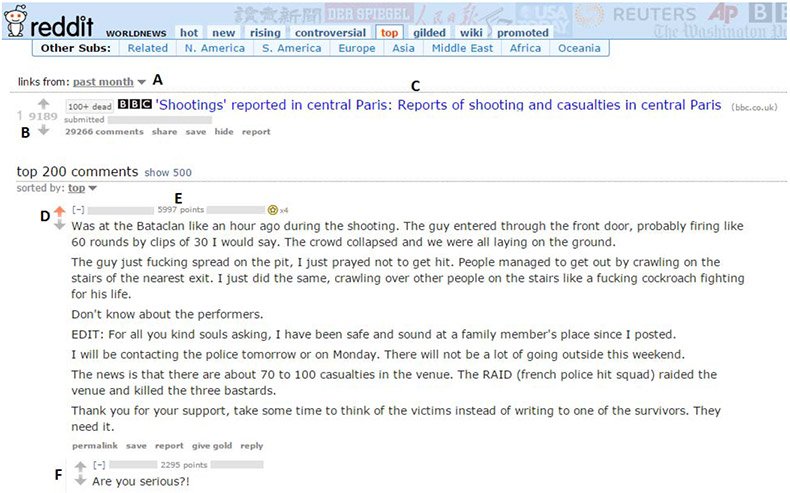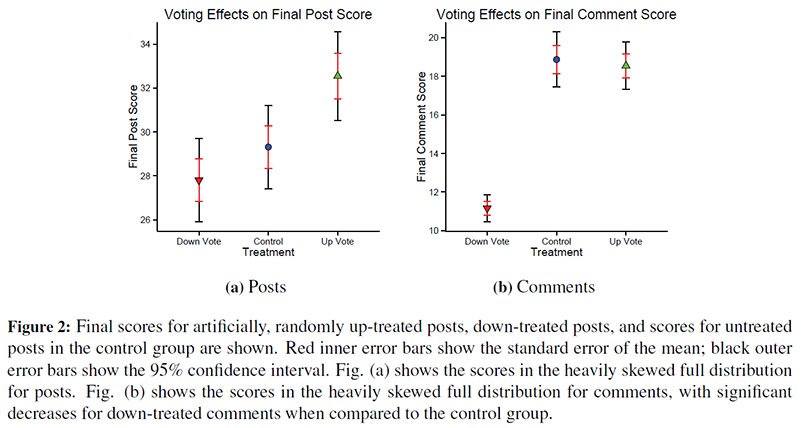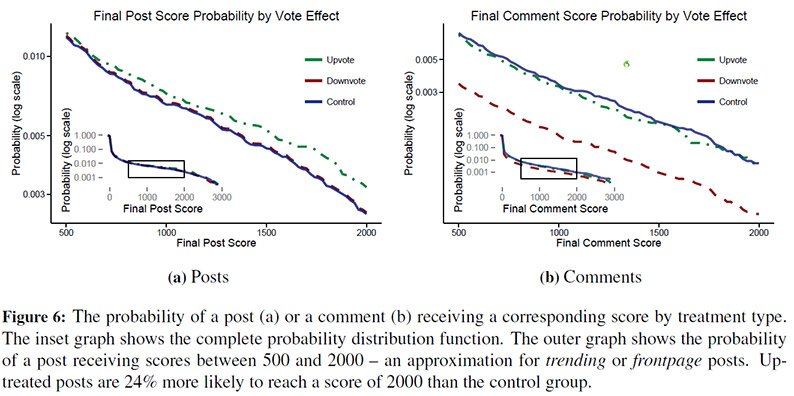Reddit is purported as being "the front page of the Internet". Viral content on Reddit can get pushed into the larger mainstream media market. With 234 million unique visitors reported last September, Reddit makes for a good field of research.

source
In 2014, Tim Weninger set out to conduct two large-scale experiments with the goal of understanding the consequences of voting behavior and how it impacts what users see and share online. Weninger was especially interested in the malicious voting behavior.
The way content gets propagated on Reddit is through a voting structure where users can up-vote or down-vote any of the posts. This determines the position, ranking, prominence and visibility of posts on Reddit.
"Most people don't vote on Reddit. But those that do become the content editors - that's essentially what they are - and they're the ones who are responsible for what's trending on the site"
Just like on Steemit, those who vote determine the visibility and trending posts. Except on Reddit a vote is a vote, and on Steemit a vote isn't simply a vote, but a vote can be like 10,000x the votes compared to another person who votes. This greatly affects the way things get promoted and become visible compared to "1 vote = 1 vote" on Reddit.
Since anyone can vote on social media, it's very easy for "bad actors" to manipulate the visibility of posts to drive certain topics, opinions or news stories to the top. Not only with up-votes alone, but also with commentary.
The Study
The study included 93,019 posts from a five-month monitoring period. All posts were randomly assigned either an up-vote, down-vote or no-vote to each post. The results were submitted to the journal Transactions on Intelligent Systems and Technology. Posts that received an up-vote were 24.6% more likely to reach the front page (with a score of at least 2000) than those with no up-vote.

source
Analysis also revealed the lower probability of a comment reaching a high score compared to the higher probability of a post reaching the same high score. This is because posts are generally viewed more than comments, since to even view a comment you need to click on the post to get to it. There are also multiple levels of comments that can be hidden in an ancestor view until a user chooses to view them all.
The research showed that an up-vote on a comment has little effect on the probability of that comment reaching a higher score. However, a down-vote has a dramatic effect instead, where the probability is greatly reduced.

source
Other Studies
The researchers involved in this first in-vivo Reddit experiment are motivated and informed by various fields, such as herding behavior, social influence, collective intelligence and online rating systems.
A similar study done on a small social news site showed results that were the opposite for comments, where liking a comment significantly increased the final tally of likes, and a down-vote on a comment hardly affected the final vote count.
Another study looked at the boost in book sales after a book's popularity was increased from appearing on the New York Times bestsellers list. Salganik and Watts studied the perception of quality and how it comes a "self-fulfilling prophecy". Inverting the actual popularity of songs in an online music marketplace resulted in that perceived but false popularity being accepted and persisting as a reality over time.
Herding Behavior, Group-Think
This demonstrates the herding behavior and social influence of mere perception and appearances without an actual regard or evaluation of the substance that is supposed to support it.
Why would people continue to support inversely popular music? Their perception was that it was popular, so they supported it. A quantity of people liked it, so they jumped onto the bandwagon. There was no honest evaluation of the quality of the music, but only in the popularity and the quantity of people who were alleged to like it and buy it.
There was only an appearance that masqueraded as substance. Motivations to purchase popularized music or books seem to come from being socially influenced by popularism and groupthink conformity. We want to fit in, and have things in common with others so that there is a basis to have something to talk about and form a relational bond around. This increases our cooperative survivability, social standing and assistance from those we network with. If something is popular, many people will adopt it based on that underlying subconscious psychological motivation.
Social Network?
This is important to understand as Reddit is not a social media network like other sites, such as Facebook or Twitter. Why is Reddit not a social network site? Because a social network is composed of what your friends do and say. In an online social network, it's what you're seeing your friends post about or like from your feed that shows the activity of the social network of your friends, not the whole site. On Reddit what you see is an aggregate valuation, or lack thereof, of everyone combined. As Weninger previously said, this valuation only comes from those who do the voting, which is a relatively small percentage of Reddit's thousands of users.
Visiblity
Votes determine visibility, and that drive more votes. Just as has been demonstrated with previous research, the social influence of groupthink and herd mentality effects what people do. Popularity is driven by quantity, not quality for those who are stuck in the herd mentality groupthink and not actually evaluate something themselves. They are just jumping on the bandwagon and following the herd.
And this is being simply demonstrated on a rating system website with no monetary rewards. When talking about Steemit instead of Reddit, this issue of quantity versus quality is even more important. Posts of content are not being evaluated for the content itself.
The Pareto Principle
There's something called the pareto principle that can be applied to social media as a 90-9-1 rule. 90% of users view the content. 9% of users "edit" the content through their voting behavior (up-vote, down-vote). 1% of users actively contribute new content. On all media websites where the votes are driven by social factors, 10% of users are the ones that determine what content becomes visible and circulates the most for the remaining 90% to view.
The active 10% determine and drive the ideas that the rest of the 90% of the users, and everyone else in the public, is exposed to and influenced by.
Those who seek to manipulate the visibility of certain content to generate more up-votes can do so by working with others through vote-based manipulation techniques.
Vote Manipulation
Vote Brigading
A group of people get together to up-vote or down-vote certain posts, topics or ideas. Twitter has this occur as well, through retweet armies that attempt to artificially manipulate and speed up a topic reaching the trending page. Digg also had this issue where the initial visibility of a post in the community was determined by how many friends you had to make it visible to a wider audience.
Vote Nudging
This is the easiest and most common type of vote manipulation on social media. A new post likely has no up-votes, which makes it less visible. People will ask their friends up-vote and comment in order to give the appearance of activity so that the post can get a little boost the popularity starting up. Users can have multiple accounts to engage in this behavior themselves.
Reverse Vote Nudging
Instead of promoting content, reverse vote nudging down-votes posts or comments that are similar and are competing for visibility in the marketplace. The relative ranking of one post will go up if another post is down-voted. People can down-vote all the other posts in order to promote their own.
Conclusions
Weninger has some poignant remarks:
"We're moving away from a dozen editors at major networks to a million editors at home on their cell phone. It's important to remember that what's trending on social media is derived from only those who vote, and may not represent the opinions of the actual, broader population."
"It is critical that we understand the dynamics of how social rating systems curate the media that we all see and hear in our daily lives. That, to me, is essential. I can't think of anything more important."
When our decisions are publicly visible, there is a group conformity factor that comes into play. The Asch conformity experiment from the 1950s demonstrates this power of conformity to the popular opinion around us can greatly affect our perception of the truth and reality.
Instead of evaluating something on its own merits, the quantity of people that like something (i.e. the popularity) will determine many people's decisions or choices at various points in their life due to fear or discomfort from deviating or going against the group consensus. This is called normative conformity, contrasting informational conformity that convinces us the group is right or correct based on information.
Majority decisions, consensus or popularity, don't determine what is correct, right or true. Beware of the pressure to conform and not speak out against things.
In group conformity, reality is not determined by you, and what is actually in reality, but instead "reality" is determined by others and you see the world the way "they" want you to see it.
This can also be called gaslighting.
For those who have followed my work on psychology, consciousness and the manipulation thereof, will know that I have talked about how the manipulators influence, inject, invoke, inculcate and summon ideas into our consciousness for us to accept as "reality". We then live our lives according to these beliefs as "truth", but not the truth of reality. This is the problem of consciousness and subjectively decided whatever we want despite reality showing things are different. We have created an unreality yet accept it as "reality". We are living a way of life that the controllers and manipulators want us to live by. Psychology and consciousness is the "battle ground" for us better our lives and the world.
Social media is no exception to being manipulated by the psychology of the group conformity effect.
Many posts or comments can have a high score yet represent an incorrect fact, or are simply contrary to the established norm. Some people have anxiety and discomfort when they are in a contrary position to what a post or comment says. If that is perceived as the prevailing popular acceptance within that social structure, they can change their position and conform to the group.
The research paper concludes saying that there is a need for countermeasures against vote chaining and social engineering strategies. They create artificial votes that tend to increase the group conformity herding effect. This doesn't provide an honest realistic evaluation of the post or content.
More Closing Remarks
I have notes I have been writing about this that need collecting and editing. Coincidently, this study demonstrates part of my point that I have mentioned here-and-there in other post or comments: quality vs. quantity as a psychological understanding so that we can get out of blindly following popularism and create something better for society; and that attention from consciousness needs to evaluate content in order for the content to have a more reality-based valuation metric on the site. Otherwise, the site isn't worth much as a place for reliable editing or curation of content that people actually value, because they aren't doing the valuing of the content themselves with their own consciousness. I have yet to make a post itself for this topic.
The responsibility to bring value to content by the organization/community that takes on that task, is not being taken as a responsibility by most people on any social media site. Except possibly to a greater degree for the actual social networking sites that are valuing the posts that come from their social network of friends. They aren't necessarily being pressure into herd mentality or groupthink conformity behavior, or to manipulate the evaluation of content to get rewards (since there are no monetary extrinsic incentives to undermine intrinsic motivations).
The social networking and friends aspect is not so much of a problem when there is no user rating system in place like Reddit or Steemit, nor rewards being given for up-voted content. Otherwise, that type of "clique"-ness will result in favoritism that again doesn't engage in honest evaluation of content for the content. If your social network are your friends, then you won't simply be favoring a like of one post, and no-like for another, just to get one post promoted more. When there is competition for ranking or rewards, and quality doesn't factor in as a primary motivator to evaluate content, but instead "connections", "friends" and favoritism are the motivators to up-vote certain posts or content, then the editor-curator system has broken down and there is a break from an honest evaluation of content for content itself.
Upvoting, liking or rewarding content is supposed to be based on the content itself, not who it comes from, who they are "networked" or "connected" with, or how popular it is. Valuing, or not valuing, and adding likes or up-votes to posts based on those deceptive psychological motivations, is a self-deception on our own part from a lack of self-knowledge. My main work tries to get to the understanding of the importance of truth in our lives to determine the condition and quality of the lives we have.
This post deals with this understanding as well through the aspect of being an editor or curator of content. There is a responsibility in that task, if you care for what you're doing, or how that reflects on the organization/community doing it, and the public visibility of what you're doing. If you're not doing the evaluating with your own consciousness and attention, then it's not actually being evaluated or valued.
How do you think the outside public would view a site that is supposed to value content, but the community that takes part in the evaluating and valuing (~10% of users) isn't actually doing the valuing? You might get some people who are ignorant of how the flawed system works and join it, but after a while they will notice things don't work right and leave if they aren't getting what they expected to get out of it, or if they don't get something else to replace it.
I didn't think the post would be this long, but when I read the research paper there was a lot of good stuff in it :)
Thank you for your time and attention! I appreciate the knowledge reaching more people. Take care. Peace.
References:
- Your (social media) votes matter
- Rating Effects on Social News Posts and Comments
- Asch Conformity Experiment
- Asch conformity experiments
If you appreciate and value the content, please consider:
Upvoting  , Sharing
, Sharing  or Reblogging
or Reblogging  below.
below.
@krnel
2017-01-25, 5pm

